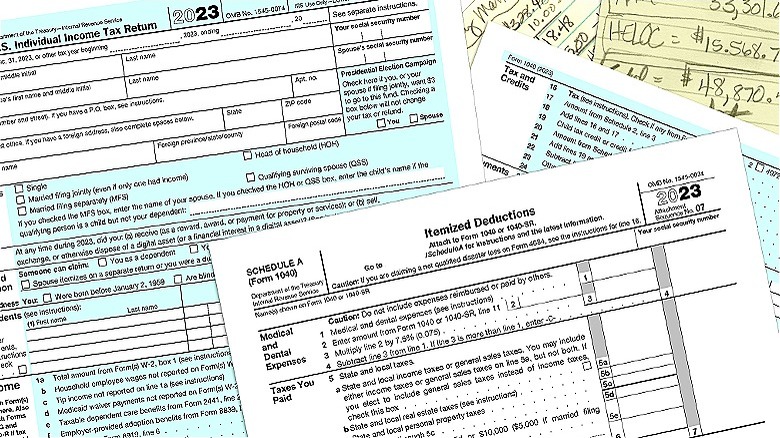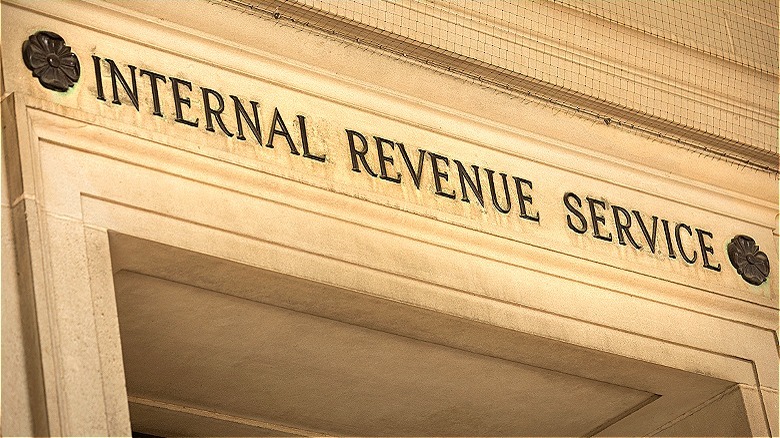The Red Flag On Your Taxes That Could Get You Audited By The IRS
Doing your taxes can be a headache and a half, especially if you decide to do them yourself. Between different schedules, forms, and income cut-offs, it can be hard to know if you've done everything right. Beyond dotting all your i's and crossing your t's, making sure you turn in the right forms (and on time) is extremely important to ensure you don't face penalties or potential IRS mix-ups. In particular, there are some specific red flags you should make sure to avoid when doing your taxes.
It's important to realize that the IRS has received a lot of new funding, and that, in September 2023, the bureau even announced a plan to dramatically increase the number of audits it imposes on filers. While the IRS claims the audits will mainly target high-income filers and large businesses (it specifically promised audit rates for taxpayers earning less than $400,000 a year will not increase), it has historically targeted low-income filers of color for audits, according to a 2023 Stanford study, done in collaboration with the Department of Treasury.
This, combined with new IRS funding, makes it more important than ever to make sure your taxes are done properly. Since no one wants extra attention from the IRS, let alone an audit, it can be important to know exactly what filing mistakes could make your return stick out (in a bad way). While there are several different things to avoid in your tax return filing, perhaps one of the most important things to avoid is including excessive credits and/or deductions compared to your income.
Why you should avoid excessive tax deductions
Due to staffing and historically low budget allocation, the IRS relies heavily on software to sort and filter through most tax returns. This often leads to tax returns with similarly reported income being grouped and compared against one another. This is why reporting excessive deductions could end up triggering a red flag. If your return shows that you're trying to claim 80% of your income as charitable deductions whereas most other people are reporting that same income without that level of deduction, your return is far more likely to trigger further examination.
The IRS software that compares returns to each other assigns each return a score, with higher numbers being more likely to trigger an audit than lower scores. With that in mind, while the statute of limitations for an IRS audit is three years, there's no time limit if the IRS decides to pursue a tax fraud investigation. As John Apisa, CPA and partner at PKF O'Connor Davies LLP, explained to CNBC, "You have to be careful, even with the simpler stuff."
While you might enjoy a higher tax offset in the short term, the potential long-term risks of filing your return with excessive credits and deductions aren't worth it. Other key filing inclusions that can make you more likely to trigger an audit include missing or not including all income, refundable credits (like the earned income tax credit), and using round numbers instead of specifics.
Other things to know about IRS audits
Per a report from Syracuse University's Transactional Records Access Clearinghouse (TRAC), the IRS audited about 0.38% of all returns during 2022 (which was down from 0.41% in 2021). Even though the 2022 Inflation Reduction Act provided the IRS with more funding, it's taking the agency time to amp up its auditing efforts. However, despite the IRS' promise to specifically target high-income filers for audits, there was only a 1.1% chance that a millionaire would be audited by the IRS in 2022. The TRAC report instead found that low-income earners who claimed the earned income tax credit (EITC) were five and a half times more likely to be audited than every other income class.
For those who might not know, the EITC is a tax break awarded to qualifying low- and moderate-income filers. While it was initially meant to serve as an anti-poverty policy, the credit instead has complicated eligibility rules that led to a consistently high error rate. With that in mind, previous TRAC reports have documented a history of the Internal Revenue Service targeting the lowest-income earners in the country due to their vulnerability as easy marks.
In 2021, 51.6% of all correspondence audits targeted the lowest income group, despite the fact that this group represents less than 15% of the total population. The number of correspondence audits (clarification requests generally sent via mail) for low-income filers rose to 58.1% in 2022. Field audits (in-person), meanwhile, also increased for low-income filers in 2022 compared to 2021.


